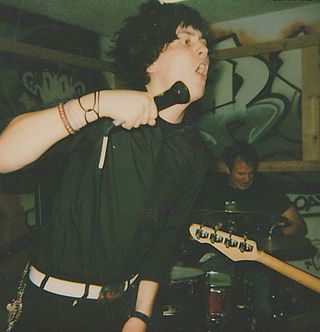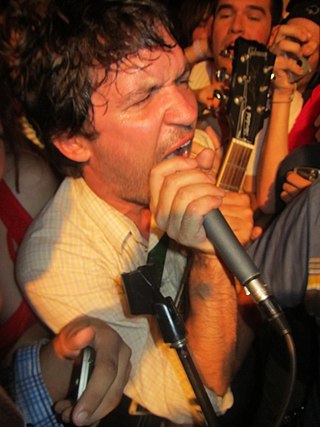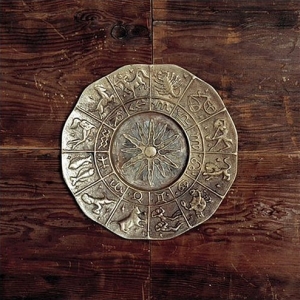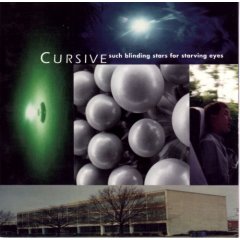
Fevers and Mirrors is the third studio album by American indie band Bright Eyes, recorded in 1999 and released on May 29, 2000. It was the 32nd release of the Omaha, Nebraska-based record label Saddle Creek Records. The album was released later in 2000 in the United Kingdom as the inaugural release from Wichita Recordings.

Every Day and Every Night is an EP by American indie rock band Bright Eyes. It became the 30th release by Saddle Creek Records on November 1, 1999.

Screamo is an aggressive subgenre of emo that emerged in the early 1990s and emphasizes "willfully experimental dissonance and dynamics". San Diego-based bands Heroin and Antioch Arrow pioneered the genre in the early 1990s, and it was developed in the late 1990s mainly by bands from the East Coast of the United States such as Pg. 99, Orchid, Saetia, and I Hate Myself. Screamo is strongly influenced by hardcore punk and characterized by the use of screamed vocals. Lyrical themes usually include emotional pain, death, romance, and human rights. The term "screamo" has frequently been mistaken as referring to any music with screaming.

Commander Venus was an American emo band from Omaha, Nebraska. Fronted by Conor Oberst and Tim Kasher, the band also included Todd Fink and Matt Bowen of The Faint, Ben Armstrong of Head of Femur and Robb Nansel, executive producer of the indie label Saddle Creek. Kasher subsequently went on to front the band Cursive, and Oberst later became famous as the core member of the indie folk collective Bright Eyes, and later the punk band Desaparecidos.

Cursive is an American indie rock band from Omaha, Nebraska. Stylistically described as emo and post-hardcore, Cursive came to prominence with 2000's Domestica and found commercial and critical success with 2003's The Ugly Organ. The band has released eight studio albums, a compilations album, and a mix of singles and EPs since 1997. They have released recordings on several labels, including 15 Passenger Records, Saddle Creek Records, and Big Scary Monsters (UK).

Timothy J. Kasher is an American musician from Omaha, Nebraska, and is the frontman of indie rock groups Cursive and the Good Life, both of which are on the Omaha-based record label Saddle Creek Records.

The Good Life is an indie rock band on Saddle Creek Records.

Album of the Year is the third album by The Good Life. The limited edition release includes a second disc with an acoustic version of the album. The enhanced CD comes with footage of videos recorded February 3, 2004, at O'Leavers in Omaha, Nebraska.
Slowdown Virginia was an indie rock band from Omaha, Nebraska. Formed in 1993, the band recorded and released one album, Dead Space, on Lumberjack Records in 1994, the predecessor to today's Saddle Creek Records. After playing an influential role in inspiring the later formation of other Omaha bands like Bright Eyes, The Faint, and Desaparecidos with their energetic live shows and recordings, Slowdown Virginia broke up in the spring of 1995. A month after breaking up, Kasher, Maginn, and Pedersen regrouped with a new drummer to form Cursive. Omaha's mixed entertainment venue Slowdown is named in honor of the band.

Mare Vitalis is the second full-length album by Lawrence, Kansas-based emo group the Appleseed Cast. It was released on Deep Elm Records in 2000.

Black Out is the second album by Omaha indie rock band The Good Life. It was released on March 4, 2002 by Saddle Creek Records. It contains 14 songs, running approximately 50:08.

The Ugly Organ is the fourth studio album by American rock band Cursive, released on March 4, 2003, through Saddle Creek Records. It was released both on black and translucent green 180 gram vinyl.

A.J. Mogis is a musician from North Platte, Nebraska. He currently plays bass guitar in the indie-rock band Criteria. His brother is Mike Mogis. Together, they founded Presto! Recording Studios and have recorded almost all the albums released by Saddle Creek Records as well as albums by friends' bands. They were also members of Lullaby for the Working Class. Criteria has so far released two albums.

Burst and Bloom is an EP by American indie rock band Cursive, released in 2001 on Saddle Creek Records. It is the band's first release with cellist Gretta Cohn. Some lyrics in the song "Sink To The Beat" reference the song-writing process and their record label. This theme would carry over to Cursive's next full length, The Ugly Organ, which again contained songs referencing the song writing process.

The Storms of Early Summer: Semantics of Song is the second full-length album by the American indie rock band Cursive, released in 1998.

Such Blinding Stars For Starving Eyes is the first full-length album from Omaha, Nebraska band Cursive. Unlike Cursive's later releases, which were released by Saddle Creek Records, this album was released by Crank! Records.

The Difference Between Houses and Homes (2005) is a compilation by American indie band Cursive of some of their early material. It is subtitled Lost Songs and Loose Ends 1995-2001. This compilation features songs from The Icebreaker 7", The Disruption 7", Sucker and Dry 7", and the split between Cursive and Small Brown Bike.

Criteria is an indie rock band from Omaha, Nebraska, formed in 2003 when ex-Cursive founding member Steve Pedersen returned to his hometown after graduating from the Duke University School of Law. He spent six months in a friend's basement where he wrote all ten songs for his new project's debut album. He recruited the help of some old friends, A.J. Mogis on bass guitar, Aaron Druery on guitar, and Mike Sweeney of Beep Beep on drums. Their first album, En Garde, was released on his previous band's label, Initial Records.

Dorothy At Forty was the first single taken from the album Happy Hollow by Cursive. It was released as a teaser for Happy Hollow on July 11, 2006. The album track "Dorothy At Forty" is backed with the exclusive non-album tracks "The Bitter End" and "The Censor". All horn arrangements were done by Nate Walcott.
Midwest emo refers to the emo scene and/or subgenre that developed in the 1990s Midwestern United States. Employing unconventional vocal stylings, distinct guitar riffs and arpeggiated melodies, Midwest emo bands shifted away from the genre's hardcore punk roots and drew on indie rock and math rock approaches. According to the author and critic Andy Greenwald, "this was the period when emo earned many, if not all, of the stereotypes that have lasted to this day: boy-driven, glasses-wearing, overly sensitive, overly brainy, chiming-guitar-driven college music." Midwest emo is sometimes used interchangeably with second-wave emo. Although implied by the name, Midwest emo does not solely refer to bands and artists from the Midwestern United States, and the style is played by outfits across the United States and internationally.


















